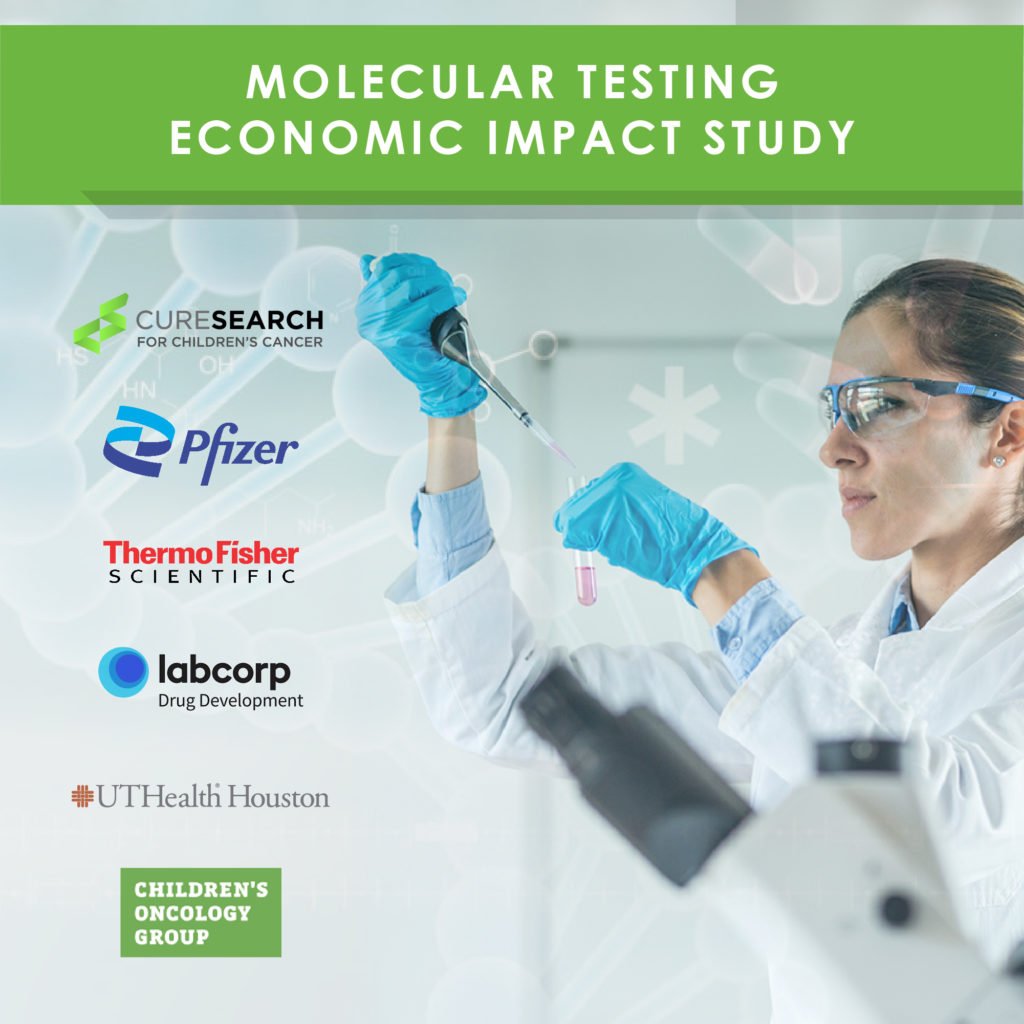CureSearch To Lead Impact Study On Cost, Treatment Benefits Of Molecular Testing For Childhood Cancer Patients
20 January 2023 | Friday | News

Cancer is the number one disease killer in children in the US. Although survival rates for the most common types of childhood cancer have greatly increased in recent years, there has been little improvement in the prognosis for many less common tumor types. There is an urgent need to adapt new technologies, techniques, and collaborative approaches to develop safe, effective therapies for children – techniques like molecular testing. CureSearch is collaborating with leading research institutions and corporations to assess how molecular characterization of a patient’s tumor impacts diagnosis, treatment, and cost of treatment.
“Many patients cannot get access to promising treatments because today’s healthcare payment systems put undue burdens on patient families, physicians, and hospitals,” said Heidi Russell, MD, PhD, Professor at the UTHealth Houston School of Public Health. “Until we address the costs and reimbursements for molecular testing, it will remain beyond the reach of many for financial reasons.” Dr. Russell is the principal investigator of the study.
In cancer, molecular testing is a laboratory method that uses a sample of tissue, blood, or other body fluid to identify certain genes, proteins, or other molecules that may indicate the presence of a tumor.
“The current era of drug development relies heavily on molecular testing as a way to identify the correct therapy for each individual patient, potentially enhancing efficacy while reducing morbidity. This is especially important when considering novel therapeutics for children with cancer,” said Geoffrey Kannan, PhD, MD, Senior Medical Director of Oncology at Labcorp Drug Development.
Increasingly, doctors and clinical researchers recognize how molecular testing helps guide treatment decisions. Unfortunately, there are significant barriers to the broad implementation of molecular testing for pediatric cancer.
“To realize the benefits of targeted therapies and identify eligible patients, molecular testing needs to be readily accessible and properly reimbursed,” said Luca Quagliata, PhD, BCMAS, COA Vice President and Global Head of Medical Affairs for Clinical Next-Generation Sequencing and Oncology at Thermo Fisher Scientific. “Through the use of ultra-rapid, automated molecular testing solutions, we can make vital genomic information actionable for clinicians treating pediatric patients with cancer, ultimately helping impact patient outcomes.”
This research will provide a better understanding of the molecular causes of childhood cancers and open the field to developing new, more effective, and potentially less-toxic treatments. This is especially important for childhood cancers with limited treatment options.
“Precise molecular characterization of pediatric tumors is critical to matching pediatric patients with the most effective, least toxic therapies, including new therapies,” said Jodi Muscal, MD, Pediatric Clinical Director at Pfizer.
To promote broad accessibility of molecular testing for children with cancer, the Children’s Oncology Group (COG) launched the Molecular Characterization Initiative (MCI) in March 2022 through its overarching cancer registry and biobanking study, Project: EveryChild (PEC). Funded by the National Cancer Institute, MCI is now open to children with newly diagnosed central nervous system tumors, soft tissue sarcoma, and a variety of other rare cancers.
“The game changer for patients is that we’re going to understand the patient’s disease precisely and comprehensively in a way that we’ve done piecemeal so far,” said Douglas S. Hawkins, MD, Group Chair of COG. “We’re hoping to remove barriers from diagnostics for all kids with cancer, no matter what type of tumor they have or where they are receiving their care.”
“Providing treatment tailored to an individual patient’s genetic cancer is a fundamental hope of pediatric precision medicine,” said Holly Zink, Director of Research and Programs at CureSearch. “An accurate molecular diagnosis can help oncologists choose the most effective and potentially least toxic treatment for each child. This landmark project will shape the future of pediatric cancer medicine.”
Real progress in advancing pediatric cancer patient care will require collaboration among science, academia, regulatory, funding, and industry leaders. CureSearch is uniquely positioned to drive critical stakeholder collaborations such as this, and accelerate the pace of pediatric drug development.
Collaborating institutions include: Children’s Oncology Group (COG), Labcorp Drug Development, Pfizer, UTHealth Houston School of Public Health, and Thermo Fisher Scientific.
Most Read
- How Does GLP-1 Work?
- Innovations In Magnetic Resonance Imaging Introduced By United Imaging
- Management of Relapsed/Refractory Multiple Myeloma
- 2025 Drug Approvals, Decoded: What Every Biopharma Leader Needs to Know
- BioPharma Manufacturing Resilience: Lessons From Capacity Expansion and Supply Chain Resets from 2025
- APAC Biopharma Review 2025: Innovation, Investment, and Influence on the Global Stage
- Top 25 Biotech Innovations Redefining Health And Planet In 2025
- The New AI Gold Rush: Western Pharma’s Billion-Dollar Bet on Chinese Biotech
- Single-Use Systems Are Rewiring Biopharma Manufacturing
- The State of Biotech and Life Science Jobs in Asia Pacific – 2025
- Asia-Pacific Leads the Charge: Latest Global BioSupplier Technologies of 2025
- Invisible Threats, Visible Risks: How the Nitrosamine Crisis Reshaped Asia’s Pharmaceutical Quality Landscape
Bio Jobs
- Sanofi Turns The Page As Belén Garijo Steps In And Paul Hudson Steps Out
- Global Survey Reveals Nearly 40% of Employees Facing Fertility Challenges Consider Leaving Their Jobs
- BioMed X and AbbVie Begin Global Search for Bold Neuroscience Talent To Decode the Biology of Anhedonia
- Thermo Fisher Expands Bengaluru R&D Centre to Advance Antibody Innovation and Strengthen India’s Life Sciences Ecosystem
- Accord Plasma (Intas Group) Acquires Prothya Biosolutions to Expand Global Plasma Capabilities
- ACG Announces $200 Million Investment to Establish First U.S. Capsule Manufacturing Facility in Atlanta
- AstraZeneca Invests $4.5 Billion to Build Advanced Manufacturing Facility in Virginia, Expanding U.S. Medicine Production
News











